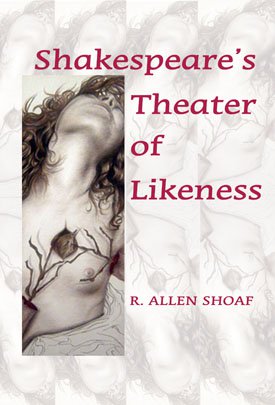
About the Author
R. Allen Shoaf, a former Marshall Scholar and Danforth Fellow, and recipient of two Fellowships of the National Endowment for the Humanities, is the author of 11 books, including Chaucer’s Body; and Milton, Poet of Duality. Over the past 20 years in the University of Florida, he has won six teaching awards as well as the Alumni Professorship in the Department of English. With the late Julian Wasserman, he co-founded the prize-winning journal EXEMPLARIA.
SHAKESPEARE’S THEATER OF LIKENESS
R. Allen ShoafNew Academia Publishing, 2006
432 Pages
ISBN 0-9767042-3-4 Paperback
ISBN 0-9767042-4-2 Hardcover
$36.00 Hardcover
For BULK ORDERS, order directly from New Academia Publishing.
Queries: orders@newacademia.com
About the Author
R. Allen Shoaf, a former Marshall Scholar and Danforth Fellow, and recipient of two Fellowships of the National Endowment for the Humanities, is the author of 11 books, including Chaucer’s Body; and Milton, Poet of Duality. Over the past 20 years in the University of Florida, he has won six teaching awards as well as the Alumni Professorship in the Department of English. With the late Julian Wasserman, he co-founded the prize-winning journal EXEMPLARIA.
About the book
The word “like” occurs some 2,400 times in the writings ascribed to Shakespeare. So many occurrences of the word suggest that Shakespeare’s is a theater of likeness, “as you like it.” This book demonstrates that part of the enduring value of Shakespeare’s art is his poetry of likeness here, in the “land of unlikeness,” where human beings invent their likenesses. It shows that Shakespeare’s theater is also Shakespeare’s theory of the psychology of likeness and unlikeness in the human striving for the most elusive (and allusive) of all attainments, an individual identity.
Praise
“This is an extraordinary book, an examination like no other of Shakespeare’s plays, a brilliant study… that will help shape for the next generation the way the world reads Shakespeare. It is long, dense, exciting, and exact… But those to whom this method is congenial will treasure this work and will come to a new understanding of where Shakespeare’s great power resides.”
– Mark Taylor, Professor of English, Manhattan College.
“Professor Shoaf has picked up on Shakespeare’s use of the word ‘like’ with its interesting ambiguities. … I can imagine this book being cited by Shakespeare critics and scholars in all kinds of contexts for years and years…This book looks like a winner.”
– Norman N. Holland, Marston-Milbauer Professor of English, University of Florida.
“I find this book to be a valuable and useful contribution to the understanding of Shakespeare. It is original and stimulating.”
– Harold Bloom, Sterling Professor of Humanities, Yale University.





 Coming Soon
Coming Soon Awards
Awards